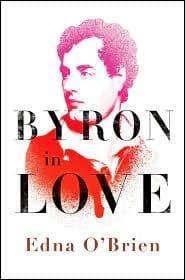Advertisement
'Mad, Bad' Byron
Resume
The great English poet and romantic Lord Byron was a genius and a terror.
He could write sublimely: “She walks in beauty, like the night...” He could — and did — thrill and terrify. “Mad, bad and dangerous to know,” was one ex-lover’s immortal tag on Byron. “A second Caligula,” was another barb.
And yet, Byron’s magnetism, his passion, cut a wide swath through early 19th-century hearts and boudoirs — even politics. He was, perhaps, the first celebrity.
Irish novelist Edna O’Brien has written a loving new account of the lover-poet unbound. This hour, On Point: "Byron in Love."
You can join the conversation. Tell us what you think — here on this page, on Twitter, and on Facebook.Guest:
Edna O'Brien joins us from London. She's the author of many acclaimed novels, including The Country Girls Trilogy, each installment of which was banned and burned in her native Ireland, upon publication in the 1960s, for their frank portrayals of sex. Most recently, her novel "The Light of Evening" won the James Joyce Ulysses Medal. Her new book is "Byron in Love: A Short Daring Life."
More:
The Poetry Foundation's Byron page offers a good biographical essay, a bibliography, and a selection of Byron's shorter poems.
Here's a brief excerpt from Edna O'Brien's "Byron in Love":
Lord George Gordon Byron was five feet eight and a half inches in height, had a malformed right foot, chestnut hair, a haunting pallor, temples of alabaster, teeth like pearls, grey eyes fringed with dark lashes and an enchantedness that neither men nor women could resist. Everything about him was a paradox, insider and outsider, beautiful and deformed, serious and facetious, profligate but on occasion miserly, and possessed of a fierce intelligence trapped however in a child’s magic and malices. What he wrote concerning the poet Robert Burns could easily serve as his own epitaph – ‘tenderness, roughness – delicacy, coarseness – sentiment, sensuality . . . dirt and deity – all mixed up in that one compound of inspired clay’.
He was also a gigantic poet, but as he reminds us, poetry is a distinct faculty and has no more to do with the individual than has the pythoness when she is off her tripod. Byron, off his tripod, becomes Byron the Man, who by his own admission could not exist without some object of love. His passions were developed very early and generated excitement, melancholy and foreboding at the loss that was bound to occur in the ‘terrestrial paradise’. He loved men and women, needing the ‘other’, whoever she or he might be. He had only to look at a beautiful face and was ready to ‘build and burn another Troy’.
The word Byronic, to this day, connotes excess, diabolical deeds and a rebelliousness answering neither to king nor commoner. Byron, more than any other poet, has come to personify the poet as rebel, imaginative and lawless, reaching beyond race, creed or frontier, his manifest flaws redeemed by a magnetism and ultimately a heroism, that by ending in tragedy, raised it and him from the particular to the universal, from the individual to the archetypal.
This program aired on July 22, 2009.